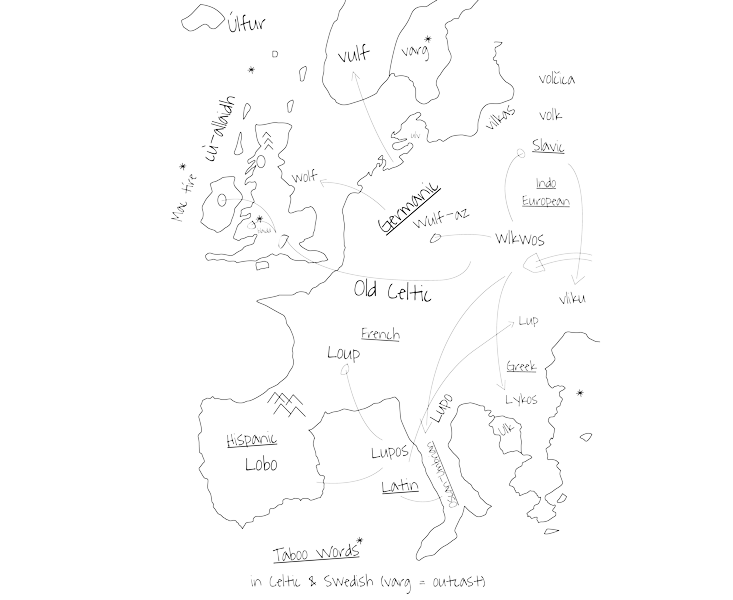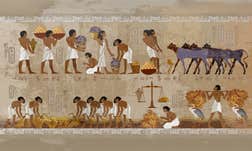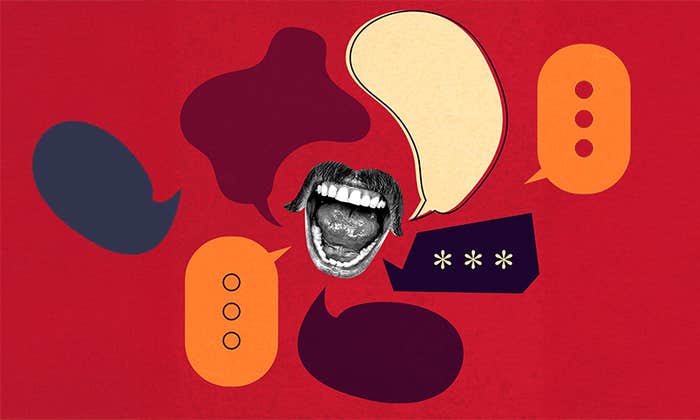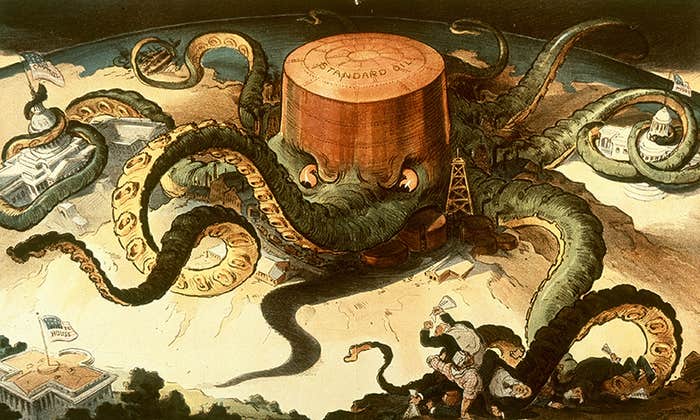Listen to them, the children of the night. What music they make!”
So says Count Dracula to the hapless Jonathan Harker in Bram Stoker’s novel. Dracula is talking about the wolves howling in the valley below his castle in the Carpathian mountains. This is the moment in the novel when Harker begins to feel the first twinges of fear.
The howl of the wolf, and the fear that accompanies it, sounds across millennia. Comparing the mythologies of cultures that descended from ancient European tribes, wolves loomed large in their minds. There are myths of heroes brought up by wolves, of great wolves who will devour the sun, of wolves guarding the underworld, and of warriors taken over by the spirit of wolves. Archaeological digs at Krasnosamarskoe, in the steppes north of the Black and Caspian seas, have given us clues that early peoples sacrificed, and even ate, dogs and wolves. Art and collected oral literature from across Asia and Europe hint of coming of age rituals where young men would wear wolf-skins, and live lawlessly on the land, almost becoming more terrifying than the wolves themselves.
The Swedish word for wolf descends from someone outcast from society for murder.
When he used the phrase “the children of the night,” Dracula was following an ancient tradition. He was avoiding the word “wolf.” In many societies, words have power, the power to summon what they name. This idea probably emerges from rituals that took place in preparation for the hunt. It was a way of calling prey so the hunt would be successful. But if words can summon prey, they can also summon danger.
Speakers had to find ways of referring to wolves without naming them. The word for wolf becomes taboo: It shouldn’t be said. Instead, the magic of summoning through a name can be tricked. By changing the sound of the word, by using another word, perhaps borrowed from another language, or by using a descriptive phrase rather than the word itself, speakers could talk of wolves, but avoid the dangerous word itself.
We can see these strategies of avoiding taboo words in English. People change the sound of words like “Hell!” or “Christ!” into “Heck!” or “Crumbs!” We have borrowed the French word “toilet” to avoid naming the place where we defecate. When the denizens of J.K. Rowling’s Harry Potter books use the phrase “You-Know-Who” for Voldemort, Rowling is appealing to the ancient magic of taboo.
Languages change. As people move across landscapes, their languages develop in different ways. They encounter new peoples, with different languages, and this can lead to a transformation in how people speak. But some words in languages change because the original term is avoided. Taboo, tightly tied to culture, has wrought radical changes in the original term for wolf in the languages of Europe. Like a werewolf changing its skin, the word for wolf has warped across the centuries, often in quite unexpected ways, as it traveled through the continent.
Dracula’s native Romanian word for wolf is lup, or in the Old Church Slavonic he learned growing up in the 15th century, vliku. These words, Romanian lup, Old Church Slavonic vliku (which later became Russian volk) and English wolf, all descend ultimately from a word in Proto-Indo-European, the ancestor of many languages spoken across the world today. The speakers of this language probably inhabited the vast steppe-lands between the Black Sea and the Caspian about 6,000 years ago, and had a way of life that involved farming and hunting, and, it appears, wolves.
Because languages change the sounds of words over time in very regular ways, linguists can use words in different languages to work backward to what the Proto-Indo-European words sounded like. We have developed rules which describe, often with pinpoint accuracy, how sounds change from one language to another, and these rules have been confirmed as new languages have been discovered baked into clay tablets, or inked onto ancient parchment. From ancient Tocharian in the west of China, through the Sanskrit descended languages of the Indian subcontinent and the ancient Iranian and Armenian languages to the Celtic languages still spoken on the fringes of Western Europe, linguists have been able to develop rules that explain the interrelationships of hundreds of languages.

Using these rules, linguists have worked out that the original Proto-Indo-European word for wolf was pronounced something like wlkwos, where the l between the w and the kw works like a vowel (think of the l in bottle, or, for some people, in milk). The Romanian, Russian, and English words for wolf can all be traced back to this ancient word wlkwos. But that word itself was taboo, and how it changed as the Indo-Europeans spread into Europe is fascinating.
Romanian is descended from Latin, and Romanian lup comes from the Latin word for wolf, lupus. But that Latin word itself is not what linguists expect for the Proto-Indo-European wlkwos. Sounds change in regular ways as languages develop. Usually, Proto-Indo-European w becomes Latin v, kw becomes qu, and that vowel-like l becomes ol. Wlkwos should have become Latin volquus. The reason it didn’t is almost certainly taboo. Lupus does make linguistic sense for some of the other languages of ancient Italy, like Oscan-Umbrian, an archaic language spoken in central Italy. In Oscan-Umbrian, Proto-Indo-European kw regularly changed to p. But linguists would still expect something like volpus. It seems that the ancestors of the Oscans and Umbrians also wanted to avoid the word for wolf. They did this by changing the sound of the word, tricking the summoning power of taboo by swapping round the order of w and l, and making the w more like a vowel. This turned wlkwos into lukwos, which, as kw became p, transformed to something like lupus (we don’t know the exact word). Latin speakers then avoided their word for wolf entirely by borrowing lupus from Oscan-Umbrian, like we borrowed toilet from French. As the Roman Empire expanded, that borrowed word went on to become Italian lupo, French loup, Spanish lobo and Romanian lup.
Tolkien co-opted an Old English word for the evil fierce wolf-monsters ridden by the orcs.
You might think it’s a bit odd that Proto-Indo-European kw changed over time to p. They seem quite different sounds. But say the word qua out loud. You do two things when you make the first sound of this word. Your tongue connects at the back to the back of your palette, and your lips come together, pursing up in a round kiss. You can simplify this sound in two ways: remove the lip rounding, to give a k, or move the closure at the back of the throat to the lips, so the sound becomes p. Some descendants of Proto-Indo-European did the latter quite generally, like Oscan-Umbrian, but the Germanic languages usually changed kw to k. Only in a very few cases, including in the word for wolf, do we find evidence of a different route. When Proto-Indo-European wlkwos developed into the ancient Germanic languages, it morphed into something like wulpaz, once again, an unexpected change. From there it became wulfaz, eventually giving Icelandic úlfur, Danish and Norwegian ulv, Old English wulf and modern German (and English) Wolf.
The Swedish word for wolf, though, is varg. This descends from an old Norse word vargr, meaning someone outcast from society for underhand murder or oath-breaking, evil deeds in Viking society. This word itself comes from a Proto-Indo-European word, roughly pronounced as hwergh, which meant to commit a crime. Hwergh is found across Indo-European languages, surfacing as vrag, enemy, in Russian, and, in the ancient language Hittite, the related word hurkil signifies sin or perversion. In Old English, the word is spelled as warg. An Old English word for a gallows is warg-tree, and Tolkien co-opted the word to use for the evil fierce wolf-monsters ridden by the orcs in The Lord of the Rings. Varg is another way of avoiding the true word for wolf.
The Celtic languages take avoidance of the word for wolf to an extreme. In the older Celtic languages the Proto-Indo-European word wlkwos vanishes. Instead, some ancient Celtic tribes coopted a different word, derived from the Proto-Indo-European waylos, meaning howler. In Old Irish, a w at the start of a Proto-Indo-European word usually became an f, giving the Old Irish word for wolf, faol, the howling one. The Celts also used the word cù, which means dog, as a means of avoiding the word for wolf. Many ancient Irish heroes and kings, like Cuchulainn or Conchobar, have names apparently based on the word dog, but the meaning was likely that of wolf. In the modern Celtic languages, the taboo remains. Modern Irish uses mac tìre, literally, “son of the land,” since the wolf ranges freely across the countryside, while Scottish Gaelic has cù-allaidh, “wild dog.” In Welsh, the word is blaidd, which is a borrowing from a now lost ancient language of Britain, borrowed so long ago that no other word for wolf descending from Proto-Indo-European is found in the language.
What of the word “wolf” today? A century ago, wolves across Europe and North America had reached their nadir. Fear of the wolf, combined with hunting, poisoning, and loss of habitat, led to a plunge in wolf populations. Scientists, though, have tamped down that fear. They have shown that wolves care for their elderly and wounded, bringing them food. Wolves have hugely complex social systems, and their presence can enrich the diversity of a wild environment.
In the past quarter century wolves have begun to flourish again, as laws protecting endangered species have come into effect, and as researchers began to show that reintroducing wolves can rebalance an ecology. The reintroduction of wolves into Yellowstone National Park has seen an ecological revival of animal and plant species in the park, and across Europe wolf packs have spread to new habitats in Germany, Poland, and Spain. New conservation areas have even been put in place in Dracula’s beloved Carpathians.
Words change meaning across time. Perhaps, as we come to understand more about wolves, we will develop new ways of talking about the ever-fascinating children of the night.
David Adger is a professor of linguistics at Queen Mary University of London. His most recent book is Language Unlimited: The Science Behind Our Most Creative Power.
Lead image: YuliyaRazukevichus / Shutterstock


























